The Third Wave
wave的用法和短语例句
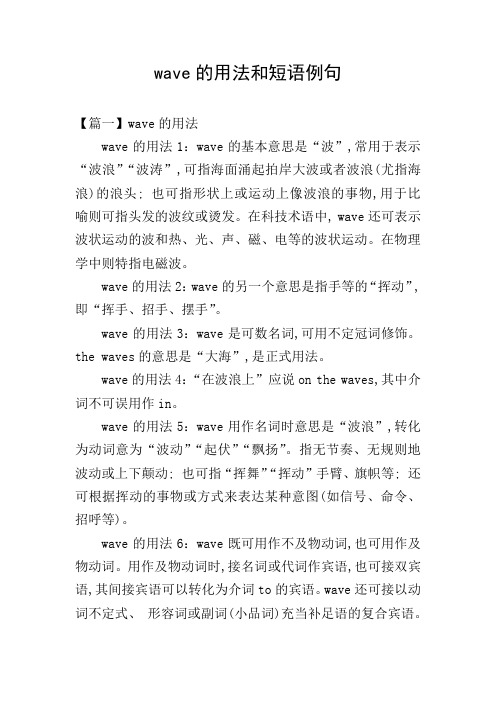
wave的用法和短语例句【篇一】wave的用法wave的用法1:wave的基本意思是“波”,常用于表示“波浪”“波涛”,可指海面涌起拍岸大波或者波浪(尤指海浪)的浪头; 也可指形状上或运动上像波浪的事物,用于比喻则可指头发的波纹或烫发。
在科技术语中, wave还可表示波状运动的波和热、光、声、磁、电等的波状运动。
在物理学中则特指电磁波。
wave的用法2:wave的另一个意思是指手等的“挥动”,即“挥手、招手、摆手”。
wave的用法3:wave是可数名词,可用不定冠词修饰。
the waves的意思是“大海”,是正式用法。
wave的用法4:“在波浪上”应说on the waves,其中介词不可误用作in。
wave的用法5:wave用作名词时意思是“波浪”,转化为动词意为“波动”“起伏”“飘扬”。
指无节奏、无规则地波动或上下颠动; 也可指“挥舞”“挥动”手臂、旗帜等; 还可根据挥动的事物或方式来表达某种意图(如信号、命令、招呼等)。
wave的用法6:wave既可用作不及物动词,也可用作及物动词。
用作及物动词时,接名词或代词作宾语,也可接双宾语,其间接宾语可以转化为介词to的宾语。
wave还可接以动词不定式、形容词或副词(小品词)充当补足语的复合宾语。
wave的用法7:wave接副词about, around, round可表示“挥动”的方式——无固定方向地摆来摆去:接about 多指上下或左右地“挥动”; 接round〔around〕多指圆弧状“挥动”。
wave的用法8:wave接介词at, to〔toward〕可表示“挥动”的对象:接to〔toward〕仅表示“朝…挥手”; 接at则含有目的性,表示“朝…挥手(致意〔威胁〕等)”。
wave的用法9:wave接副词小品词away, back, down, off, on可表示“挥动”的目的:接away表示“挥手示意…离开”; 接back表示“挥手示意…后退”; 接down表示“挥手示意…停下”; 接off表示“挥手为…送行”; 接on表示“挥手示意…前进”。
中国的三次移民潮
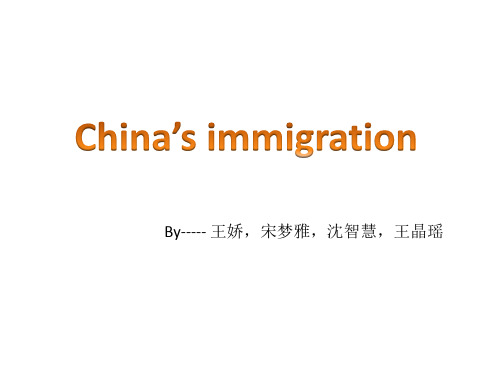
In 1994, the amount of overseas labour has reached 160,000.
Reason: • The upheaval in eastern Europe and the collapse of the Soviet union bring the oppotunity of immigration. • Due to the shortage of labour, Europe are willing to accept a large number of immigrants. Trend: • Showing a trend of diversification, immigrants involve the people who are engaging in business, finance, education, science and technology, etc.
2. further study
There were many students immigrating to developed countries. Among them, the amount of students heading for Japan were especially large, which was due to the friendly atmosphere between China and Japan at that time. But it was much harder for them to Japan. Therefore eventually, Canada and America have gained an increasing number of immigrates caused by students.
wave的用法和短语例句意思是什么
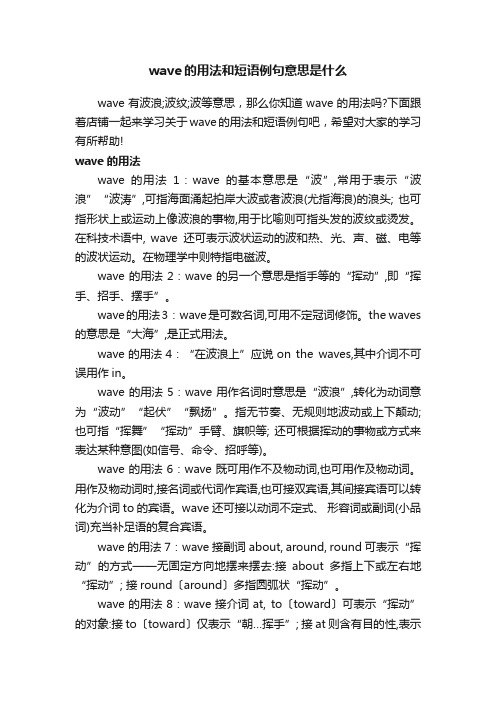
wave的用法和短语例句意思是什么wave有波浪;波纹;波等意思,那么你知道wave的用法吗?下面跟着店铺一起来学习关于wave的用法和短语例句吧,希望对大家的学习有所帮助!wave的用法wave的用法1:wave的基本意思是“波”,常用于表示“波浪”“波涛”,可指海面涌起拍岸大波或者波浪(尤指海浪)的浪头; 也可指形状上或运动上像波浪的事物,用于比喻则可指头发的波纹或烫发。
在科技术语中, wave还可表示波状运动的波和热、光、声、磁、电等的波状运动。
在物理学中则特指电磁波。
wave的用法2:wave的另一个意思是指手等的“挥动”,即“挥手、招手、摆手”。
wave的用法3:wave是可数名词,可用不定冠词修饰。
the waves 的意思是“大海”,是正式用法。
wave的用法4:“在波浪上”应说on the waves,其中介词不可误用作in。
wave的用法5:wave用作名词时意思是“波浪”,转化为动词意为“波动”“起伏”“飘扬”。
指无节奏、无规则地波动或上下颠动; 也可指“挥舞”“挥动”手臂、旗帜等; 还可根据挥动的事物或方式来表达某种意图(如信号、命令、招呼等)。
wave的用法6:wave既可用作不及物动词,也可用作及物动词。
用作及物动词时,接名词或代词作宾语,也可接双宾语,其间接宾语可以转化为介词to的宾语。
wave还可接以动词不定式、形容词或副词(小品词)充当补足语的复合宾语。
wave的用法7:wave接副词about, around, round可表示“挥动”的方式——无固定方向地摆来摆去:接about多指上下或左右地“挥动”; 接round〔around〕多指圆弧状“挥动”。
wave的用法8:wave接介词at, to〔toward〕可表示“挥动”的对象:接to〔toward〕仅表示“朝…挥手”; 接at则含有目的性,表示“朝…挥手(致意〔威胁〕等)”。
wave的用法9:wave接副词小品词away, back, down, off, on 可表示“挥动”的目的:接away表示“挥手示意…离开”; 接back表示“挥手示意…后退”; 接down表示“挥手示意…停下”; 接off表示“挥手为…送行”; 接on表示“挥手示意…前进”。
艾米丽悲剧的原因分析
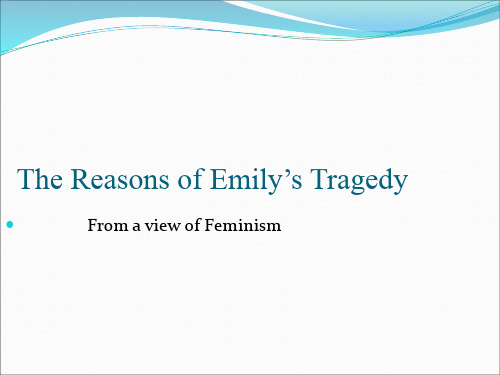
In Khost,2008
The first The second
fight The third
The three fights in “A rose for Emily”
The first fight: cut short hair. The second fight: fell in love with “Homer”.(against
New York, 6 May in 1912
The history of “feminism”
The second wave was associated with the ideas and
actions of the women's liberation movement beginning in the 1960s. The second wave campaigned for legal and social equality for women.
From a view of Feminism to analyze the tragic reasons of Emily
Oppression under patriarchy(父权制度下的家长压迫
) Scapegoat of southern tradition(南方传统的替罪羊) eg: the first sentence of the third paragraph.
The history of “feminism”
The third wave is a continuation of, and a reaction to,
the perceived failures of second-wave feminism, beginning in the 1990s.
女权运动
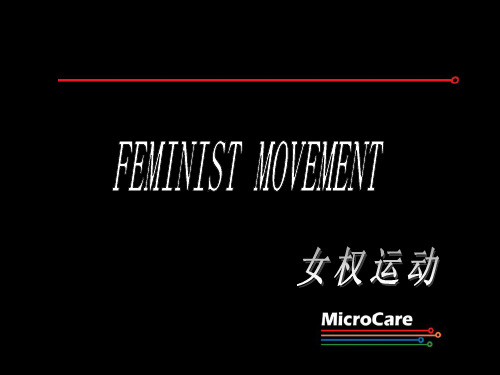
英国基督教会礼仪认为:“女人的意志应服从男子,男子是她 的主人,也就是说,女人不能按她自己的意志生活,……离开 了男人,她既不干任何事而且也干不成任何事。男人怎么做她 就怎么做,她应把男人当做主人来侍奉,她应畏惧男人,服从 和臣属于男人。”
-------17世纪的基督教 会
从谚语的内容看女性的传统社会地位
Influences
Social changes Religion Language Education
Language
Influences
Social changes Religion Language Education
Education
coeducation
Most men's colleges in The US adopted coeducation, often by merging with women's colleges.
4. The accident was a word in the Civil Rights Act passed in 1964.
The third wave
In the early 1990s, the third wave of feminism, arose in response to the perceived failures of the second wave feminism.
• 《斯泰拉做出格》(Stella Dose Tricks1996) • 《心灵深处》(Under the Skin1996 • 《大脑长在脚上的姑娘》(the Girls with
Brain in Her Feet,1997). • 《真实的女性》(Real Women1998)
Unit 4 Immigrants

• In August 1963, excerpts of the 1958 pamphlet were published in the New York Times Magazine. He was assassinated before completing the revision, but the book was nevertheless posthumously published in 1964 with an introduction by his brother, then Attorney General Robert F. Kennedy.
1820-1870
The reason for immigration in the period from 18201870 is quite clear. Land remained plentiful, and fairly cheap. Jobs were abundant, and labor was scarce and relatively dear. A decline in the birthrate as well as an increase in industry and urbanization reinforced this situation. The United States, in the 19th Century, remained a strong magnet to immigrants, with offers of jobs and land for farms. Glowing reports from earlier arrivals who made good reinforced the notion that in America, the streets were, "paved with gold," as well as offerings of religious and political freedom…
江苏省苏州市第五中学2024_2025学年高二英语下学期期中试题

苏州五中2024-2025学年其次学期期中调研测试高二英语2024.4 第一部分:听力(共两节,满分20分)第一节(共5小题;每小题1分,满分5分)听下面5段对话。
每段对话后有一个小题,从题中所给的A、B、C三个选项中选出最佳选项,并标在试卷的相应位置。
听完每段对话后,你都有10秒钟的时间来回答有关小题和阅读下一小题。
每段对话仅读一遍。
1. How much do two cups cost?A. Two dollars.B. Three dollars.C. Four dollars.2. Who is NOT in the picture?A. The man’s father.B. The man’s grandma.C. The man’s grandpa.3. What are the speakers doing?A. Inquiring.B. Arguing.C. Complaining.4. What does the woman ask the man to do?A. Call her back later.B. Have lunch with her.C. Take a look at the room.5. What do we know about Jason?A. He will arrive at 7:30.B. He seldom arrives on time.C. He should have arrived at 8:00.其次节(共15小题;每小题1分,满分15分)听下面5段对话或独白。
每段对话或独白后有几个小题,从题中所给的A、B、C三个选项中选出最佳选项,并标在试卷的相应位置。
听每段对话或独白前,你将有时间阅读各个小题每小题5秒钟;听完后,各小题将给出5秒钟的作答时间。
每段对话或独白读两遍。
听第6段材料,回答第6至7题。
6. What happened to the woman?A. She lost her license.B. She forgot to take her license.C. She didn’t obey the traffic rules.7. How much should the woman pay?A. 100 Yuan.B. 80 Yuan.C. 20 Yuan. 听第7段材料,回答第8至9题。
knock的过去式和过去分词
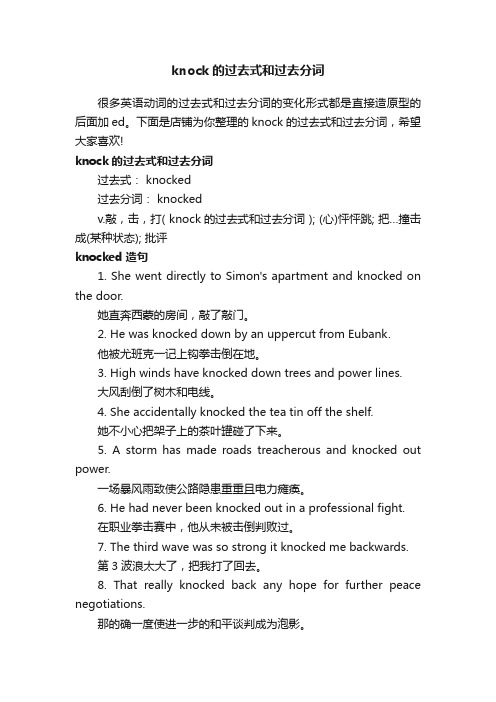
knock的过去式和过去分词很多英语动词的过去式和过去分词的变化形式都是直接造原型的后面加ed。
下面是店铺为你整理的knock的过去式和过去分词,希望大家喜欢!knock的过去式和过去分词过去式: knocked过去分词: knockedv.敲,击,打( knock的过去式和过去分词 ); (心)怦怦跳; 把…撞击成(某种状态); 批评knocked造句1. She went directly to Simon's apartment and knocked on the door.她直奔西蒙的房间,敲了敲门。
2. He was knocked down by an uppercut from Eubank.他被尤班克一记上钩拳击倒在地。
3. High winds have knocked down trees and power lines.大风刮倒了树木和电线。
4. She accidentally knocked the tea tin off the shelf.她不小心把架子上的茶叶罐碰了下来。
5. A storm has made roads treacherous and knocked out power.一场暴风雨致使公路隐患重重且电力瘫痪。
6. He had never been knocked out in a professional fight.在职业拳击赛中,他从未被击倒判败过。
7. The third wave was so strong it knocked me backwards.第3波浪太大了,把我打了回去。
8. That really knocked back any hope for further peace negotiations.那的确一度使进一步的和平谈判成为泡影。
9. When I got knocked up, the whole town knew it.我怀孕时,整个镇子都知道了。
罗恩琼斯的试验第三浪潮(RonJones
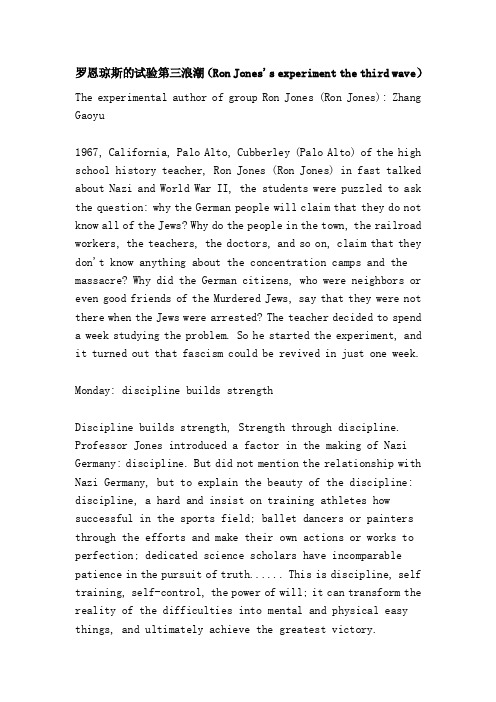
罗恩琼斯的试验第三浪潮(Ron Jones's experiment the third wave)The experimental author of group Ron Jones (Ron Jones): Zhang Gaoyu1967, California, Palo Alto, Cubberley (Palo Alto) of the high school history teacher, Ron Jones (Ron Jones) in fast talked about Nazi and World War II, the students were puzzled to ask the question: why the German people will claim that they do not know all of the Jews? Why do the people in the town, the railroad workers, the teachers, the doctors, and so on, claim that they don't know anything about the concentration camps and the massacre? Why did the German citizens, who were neighbors or even good friends of the Murdered Jews, say that they were not there when the Jews were arrested? The teacher decided to spend a week studying the problem. So he started the experiment, and it turned out that fascism could be revived in just one week.Monday: discipline builds strengthDiscipline builds strength, Strength through discipline. Professor Jones introduced a factor in the making of Nazi Germany: discipline. But did not mention the relationship with Nazi Germany, but to explain the beauty of the discipline: discipline, a hard and insist on training athletes how successful in the sports field; ballet dancers or painters through the efforts and make their own actions or works to perfection; dedicated science scholars have incomparable patience in the pursuit of truth...... This is discipline, self training, self-control, the power of will; it can transform the reality of the difficulties into mental and physical easy things, and ultimately achieve the greatest victory.In order to allow students to experience discipline, the teacher asked students to practice and adopt a new sitting posture: feet flat on the ground, hands on the back, back straight. "Do you feel more open?" It makes you sober up. This is a better sitting position." The teacher also trains students to quickly return to the classroom outside the classroom without making any noise, and takes no more than 15 seconds.The students are so quick to accept this form of unity. The teacher was curious. How far would they go like this?. Is the pursuit of discipline and consistency the needs of human nature? At the end of the class, the teacher and Jones announced some discipline, including: all students must bring pen and paper to record; time to ask questions or answer questions, the first sentence must be "Sir Jones" (Mr. Jones); answer the questions must be 3 characters or less...... In terms of performance, the students are better at learning.Tuesday: unity is strengthUnity is strength, Strength through community. On Tuesday, the teacher walked into the classroom, the students found, in perfect silence with the "right" sitting in his seat. Please hang the teacher's smile on the face of some people, and more people eyes just straight forward, full of curiosity. In order to alleviate the tension, the teacher wrote two lines of words on the blackboard, the first line is Strength through discipline, the next line is Strength through community. And then, in the solemn silence of the students, the teacher began to talk about the meaning of unity. The teacher made up somestories based on his personal experience as an athlete, coach and historian. "Community is that bond between individuals who work and struggle together.It's feeling that you are... A part of something beyond yourself, a movement, a team, La Raza, a cause." by giving two slogans on the blackboard, the students from each other's eyes, they seem to have felt the collective sense of belonging sense: everyone is equal, everyone together to do one thing.At the end of the morning class, the teacher creates a salute gesture, the right hand makes a wave (similar to the wave), and calls it the third Wave Third (The).Since there is a salute gesture, the teacher stipulates that all members must salute when they meet outside the classroom. So, when students walk in the hall, they suddenly see three students doing wave gestures with each other; in the library or gymnasium, students outside the classroom will also see this strange action...... In a word, this gesture of salute drew attention in the whole school and even in the small town. Many other classes ask if they can join the class.Wednesday: action, practice, powerOn this day, the teacher decided to send a "membership card" to every student who would like to continue to stay for "experiment"". And everyone was willing to stay. But today, the number of students in the classroom has changed from 30 to 43 -- 13 people have warped their classes to join the classroom of Mr. Jones. The teacher on the card, 3 card marking X red, then said to the class of a task to get such cards is the studentsreport to the teacher any breach of discipline, the teacher did not say who got the X card, also did not say how many people get a X card.Then, the teacher began to talk about the meaning of "action": without action, any discipline and solidarity are worthless. The teacher stressed the importance of diligence and effort. The children seem really touched, in a few class, the students have said, "Mr. Jones, I have never learned so many things like this," Mr. Jones, why don't you always teach"...... The teacher was shocked because he knew he was using extreme "cramming" teaching, and the students felt comfortable and natural! Are students willing to do anything that the teacher arranges? Jones decided to try it out.So, he began to sign assignment: XX to design a "third wave"; to prevent any non Moumou responsible for the "third wave" members into the classroom; so must be able to remember all members in tomorrow's name and address; so the correct posture must successfully let 20 students near the primary school to use learning to read the brochure for certain; and in the end of the session to all the contents of the class repeat inside; the class must all tell the teacher that you consider a reliable enough to join the "third wave" of the friend's name and address...... At the end of the task, the teacher is given to absorb the new rules for the members: any new members must be recommended by the old members, then the teacher sent the card, finally, the applicant must be able to repeat all the provisions of the "third wave" and sworn to obey these requirements to be approved by the membership.The whole school became active. Everyone is curious: the school cook asked "third wave" biscuit is what appearance, Jones told him that he is a chocolate tablets; one afternoon the staff meeting, the headmaster came running toward Jones made a wave of gestures, of course Jones had to return in the past...... At the end of the day, more than 200 students have joined the "third wave"". The teacher was a little scared about it. However, let the teacher's surprise, he had only three students were assigned to monitor and report the work day, there are nearly 20 people came to say "so don't obey the rules" in authoritarian environment for the teacher, it seems that everyone can become an informer!There were three girls in the class before they were the smartest and the best. However, in this egalitarian tide, for the individual awards in this group does not exist, so in the experiment with "militarism" atmosphere, they seem a little confused some heavy-hearted. Most of them don't take part in the class activities. They talked to their parents about what happened in the class. Then one of the parents invited Mr. Jones to come home. The teacher told the parents that he was just learning German human nature during World War ii. As a result, the parents were very happy to hear the teacher's explanation,He said he would talk to the other parents, so that the teacher didn't have to worry about the parents. Here, it seems to have been able to explain the beginning of the question, "Why are the people in the town, the railroad workers, the teachers, the doctors, and so on, all claiming that they don't know anything about the concentration camps and the Holocaust?"" This seems to be the instinctive disregard of human nature.There was a student named Robert in the class. He was always alone, and he often ate in the classroom alone in his lunch. Robert. However, the "third wave" gave Robert a new birth: he was as equal as everyone, and he could finally do something that he felt was meaningful. On Wednesday afternoon, Jones found that the boy followed him all the way, and he asked him what he was doing. Robert said, "Mr. Jones, I'm going to be your bodyguard. I'm worried about something.". Is that OK?" So Jones had a bodyguard. The bodyguard is always in the right side of Jones, he will smile the way with other members of the staff will be the wave of the ceremony, the meeting standing quietly beside Jones and smiled and explained to the other teacher said he is not a student, but a bodyguard.Despite a bodyguard, today's teacher Jones is still exhausted, "third wave" seems to have lost control, the children do not know what they are doing. He had to figure it out.Thursday: power comes from gloryStrength through pride. thought of a way to end the wave. He announced to the students, "is not a teaching experiment, the third wave", is actually a nationwide premeditated major campaign aimed at selecting those talented young people to complete the political reform movement in the country, so like the teacher in the organization's activities, tens of thousands of; the ultimate purpose of third wave "is like other people, through discipline, unity, honor and action, the society can be better; if we can change the school's mode of operation, it can change the mode of operation of factories, shops, and anyother university institutions; now all members are the outstanding youth is selected, if in the future be able to by learn this four days, then the" third wave "will change the face of the country.In order to make the students more convinced that this news, the teacher announced Friday at noon all the "third wave" of members in the school auditorium a rally, there will be a candidate for president at a press conference to announce the "third wave" of the existence of teachers hope all members to have witnessed this historic event "" of course, through television, rather than the scene.Friday: the power of understandingStrength through understanding.On this day, the teacher invited some of his friends, holding the camera, pretending to be like. At 12:05, the teacher turned off all the lights and turned on the tv. In the hall the air suddenly stagnate, everyone excitedly waiting for the moment. However, the Chi Chi TV is just a snowflake. 12:07, originally done neatly the crowd began to stir, you do not believe, "not a leader to appear?" At this point, the teacher went up to the platform and turned off the tv."Listen, I've got something important to tell you. All sit down.""Actually, there's no leader. There is no national movement of the third wave!"The teacher began to explain the issues that were raised this week: Fascism, dictatorship, surveillance, and informers......A great history teacher is good at talking about things. Then, the teacher showed a real image of Nazi germany. The students seemed to awaken by his resurrection: fascism!The trial ended.。
The Third Wave
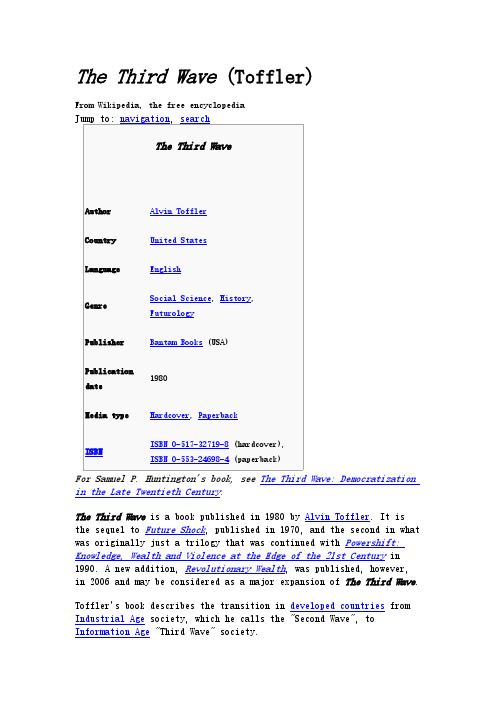
The Third Wave (Toffler)From Wikipedia, the free encyclopediaFor Samuel P. Huntington's book, see The Third Wave: Democratization in the Late Twentieth Century.The Third Wave is a book published in 1980 by Alvin Toffler. It is the sequel to Future Shock, published in 1970, and the second in what was originally just a trilogy that was continued with Powershift: Knowledge, Wealth and Violence at the Edge of the 21st Century in 1990. A new addition, Revolutionary Wealth, was published, however, in 2006 and may be considered as a major expansion of The Third Wave. Toffler's book describes the transition in developed countries from Industrial Age society, which he calls the "Second Wave", to Information Age "Third Wave" society.Contents[hide]∙ 1 Toffler's Wave Theory∙ 2 Anthropological Interpretation∙ 3 Key Characteristics Of The Third Wave Society∙ 4 Fourth Wave∙ 5 Publication∙ 6 References∙7 External linksToffler's Wave Theory[edit]In the book Toffler describes three types of societies, based on the concept of 'waves' - each wave pushes the older societies andcultures aside.∙The First Wave is the settled agricultural society which prevailed in much of the world after the Neolithic Revolution,which replaced hunter-gatherer cultures.∙The Second Wave is Industrial Age society. The Second Wave began in Western Europe with the Industrial Revolution, andsubsequently spread across the world. Key aspects of SecondWave society are the nuclear family, a factory-type educationsystem and the corporation. Toffler writes:"The Second Wave Society is industrial and based on massproduction, mass distribution, mass consumption, mass education, mass media, mass recreation, mass entertainment, and weapons of mass destruction. You combine those things with standardization, centralization, concentration, and synchronization, and youwind up with a style of organization we call bureaucracy."∙The Third Wave is the post-industrial society. Toffler says that since the late 1950s most countries have beentransitioning from a Second Wave society into a Third Wavesociety. He coined many words to describe it and mentions names invented by others, such as the Information Age.Anthropological Interpretation[edit]The transition from the earlier hunter-gatherer societies to the agrarian and agricultural societies is also known as the Neolithic Revolution. This coincides with the transition from the Mesolithicera to the Neolithic era (respectively, the Middle and Late Stone Age). The transition from the Paleolithic to the Mesolithic (Early to Middle Stone Age), in turn, largely coincides with the emergence of the modern Homo sapiens from earlier, related archaic human species.Nearly extinct in the present-day world, hunter-gatherer societies (which one might term the "Zero Wave" societies) are not recognizedin Toffler's scheme. Similarly, in the classical Three-age system, distinctions are recognized between the Stone Age era Bronze Age,Iron Age, the boundary between the latter two c. 1300-1200 BC being as dramatic as that demarcating Toffler's waves. None of these phases are clearly recognized in the Toffler scheme, in part due to the prevalence of the latter phase amongst present-day pre-industrial societies.The transition from Toffler's First Wave and Second Wave is sometimes also recognized as a transition from the Iron Age to the Steel Age. At present, there is no clear delineation of the latest transition, though sometimes the term Post-industrial society, originating from Daniel Bell, is used, in addition to Toffler's "Third Wave society".The important point is that the nature of society (relationships between people and political and economic structures) aresignificantly altered by the impact of new technology. That to some degree peoples lives are modified to serve the technology.Key Characteristics Of The Third WaveSociety[edit]This section possibly contains original research. Pleaseimprove it by verifying the claims made and adding inlinecitations. Statements consisting only of original research maybe removed. (June 2010)Though the society foreseen is still emerging, with the dramatic transitions of the past two decades (e.g. Cell Phones, Internet, the rise of non-national and super-national powers, etc.), several distinguishing features were posed as characteristic of this new society. Among others, these included∙The rolling back of the Industrial-Era creed of"standardization", as exemplified in the one-size-fits-allapproach typical of institutions of this era, such as theeducation system, factories, governments, mass media, highvolume mass production and distribution, etc.∙The attack on the nation-state from above and below and progressive obsolescence of the nation-state itself.∙The assault on the nation-state from below would include both the gradual loss of consensus, such as has characterized thepolitics of the United States in the 21st century, as well as political turmoil in China (largely split amongst urban-rurallines), Israel (orthodox vs. secular), Germany (the deadlockfollowing the 2005 elections), the Islamic world(fundamentalist or traditional vs. secular) and elsewhere. It would include the rise of regional interests and theprogressive devolution of the nation-state itself; e.g. theautonomization of Wales and Scotland in Britain; of Nunavut and Canada; the frequent incidence of separatist movements, thedissolution of Yugoslavia, Czechoslovakia, the USSR, Ethiopia, the emergence of microstates, such as East Timor.∙The assault on the nation-state from above would include the rise of powerful non-national entities: IGO's, multinationalcorporations, religions with global reach, and even terrorist organizations or cartels. It would include the progressivehemming-in of national economies and of nation-states under a growing network of super-national organizations andaffiliations; e.g. the European Union, the North American Union, the newly formed African Union, as well as organizations such as the WTO, NAFTA or International Criminal Court.∙The eclipsing of monetary wealth by knowledge and information as the primary determinant of power and its distribution. This was also discussed more fully in the sequel Powershift.∙The eclipsing of manufacturing and manufacturing goods by knowledge-production and information-processing as the primary economic activity. This was significantly expanded on in thesequel Powershift, where Toffler nearly drew the line between the two along gender lines, coining the term "Material-Ismo" (a play on "machismo") to represent the infatuation with theindustrial era world of manufacturing (as opposed to paper-pushing), and equating value with product (as opposed equating value with information). The criticism came down particularly hard on the former Stalinist societies, that have in recentyears seen a substantial dislocation, particularly along genderlines, with female life expectancy now as much as 10 yearsgreater than male life expectancy throughout the former USSR.∙The emergence of various high technologies, such as cloning, global communications networks, nanotechnology, etc. However,these aspects were discussed in greater depth in Future Shockand somewhat deemphasized in the Third Wave.∙ A transformation of the very character of democracy, itself, from rule-by-periodic polling at the election booth, toward amore direct interaction between the government and its populace.To a large extent, this has already emerged with the rise ofthe Internet, though it has not yet congealed in the form of afundamental revision of the constitution of any state. Thetrend toward on-line voting in the United States, following the election crisis of 2000, may be seen as a first step in thisdirection.Discussing the book in a later interview, Toffler said thatindustrial-style, centralized, top-down bureaucratic planning wouldbe replaced by a more open, democratic, decentralized style which he called “anticipatory democracy.”[1]Despite the forecast of the obsolescence of the order of nation-states, and the rise of super-national entities, what was notforecast was the emergence of a world political union cast in theform of the United States of Earth. In the framework of the Wave Theory of Toffler, such an institution, if constituted along lines similar to present-day nation states, would represent the very archetype of the Second Wave writ large. Curiously, the potential ofa federal world union cast in the mould of a heterogeneous mix (e.g. nations, labor unions, religions affiliations, businesses, popular assemblies, IGO's, etc. all brought together in an overlapping mix) was left open.Toffler left open both the question of what the outcome of the transformation of the structure of democracy was to entail, as wellas the question of what kind of world order would supersede the order of nation-states. This became particularly acute in the 1993 addendum War and Anti-War which raised the issue of the "Genie out of the Bottle" (nuclear proliferation) and the illusion of the "Zone of Peace" being broken (i.e., 9-11, Madrid, London, etc.), but remained silent on the questions of what changes in the structure of the world would be required to resolve these dilemmas, if the nation-state isto become obsolete and "United State of Earth" type global organizations just as much so.Fourth Wave[edit]Though talk about another major historical watershed on par with the Neolithic Revolution may seem premature, given that the Third Wavehas only reached its crest with the advent of the Internet, one of the central themes of Future Shock is that history, itself, would accelerate to the point where all of the past would catch up with the present. Therefore, the question has been raised with increasing frequency as to whether a Fourth Wave is looming or already underway with the most recent dislocations that appear to be taking place in the world.There has already been one book, published in 1993, titled Fourth Wave: Business in the 21st Century by Herman Bryant Maynard and Susan E Mehrtens, which forecasts and advocates the rise of a form of eco-globalism in the 21st century. A closer reading of the book, however, may mistake its central theme as a partial completion of the questions left open by Toffler concerning the nature of Third Wave society at the global level, rather than another major historical watershed.However, the question is still unresolved and no official word has been forthcoming from Toffler. Nor is one likely, given the quote "the sweeping synthesis [of the trilogy] Powershift。
Third Wave Systems发布金属切削仿真软件AdvantEdge FEM 5
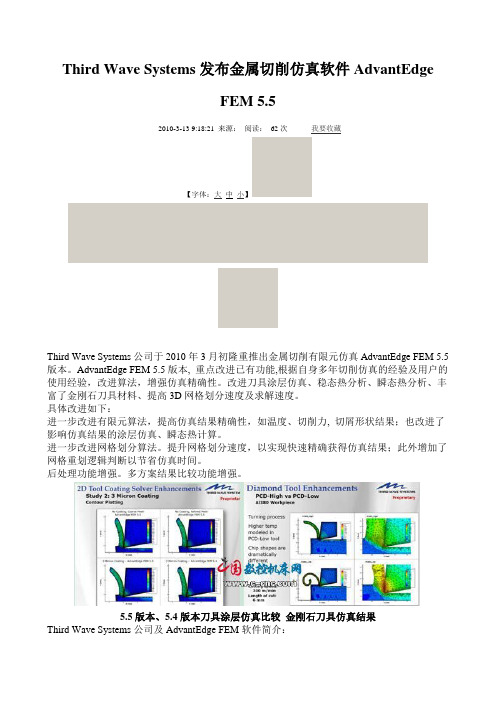
Third Wave Systems发布金属切削仿真软件AdvantEdgeFEM 5.52010-3-13 9:18:21 来源:阅读:62次我要收藏【字体:大中小】Third Wave Systems公司于2010年3月初隆重推出金属切削有限元仿真AdvantEdge FEM 5.5版本。
AdvantEdge FEM 5.5版本, 重点改进已有功能,根据自身多年切削仿真的经验及用户的使用经验,改进算法,增强仿真精确性。
改进刀具涂层仿真、稳态热分析、瞬态热分析、丰富了金刚石刀具材料、提高3D网格划分速度及求解速度。
具体改进如下:进一步改进有限元算法,提高仿真结果精确性,如温度、切削力, 切屑形状结果;也改进了影响仿真结果的涂层仿真、瞬态热计算。
进一步改进网格划分算法。
提升网格划分速度,以实现快速精确获得仿真结果;此外增加了网格重划逻辑判断以节省仿真时间。
后处理功能增强。
多方案结果比较功能增强。
5.5版本、5.4版本刀具涂层仿真比较金刚石刀具仿真结果Third Wave Systems公司及AdvantEdge FEM软件简介:成立于1993年的美国Third Wave Systems公司,其主要业务是开发和销售金属切削有限元仿真软件AdvantEdge FEM及工艺NC代码优化软件Production Module。
AdvantEdge FEM是一款CAE软件,用于优化金属切削工艺。
这款分析软件适用于提高零件质量,增加材料去除率,延长刀具寿命等等。
利用AdvantEdge FEM 可以减少试切次数,通过方案比较获得优化的切削参数及刀具选择。
AdvantEdge FEM可以分析的工艺:车削、铣削(含插铣、玉米铣)、钻孔、攻丝、镗孔、环槽、锯削、拉削;进给在10纳米以上1微米以下的微切削目前只支持2D车削仿真。
材料库:软件材料库有130多种工件材料(铝合金、不锈钢、钢、镍合金、钛合金及铸铁);刀具材料库Carbide系列、立方碳化硼、金刚石、陶瓷及高速刚系列;涂层材料有TiN、TiC、Al203、TiAIN;支持用户自定义材料及自定义本购方程。
女性主义英文介绍(1)
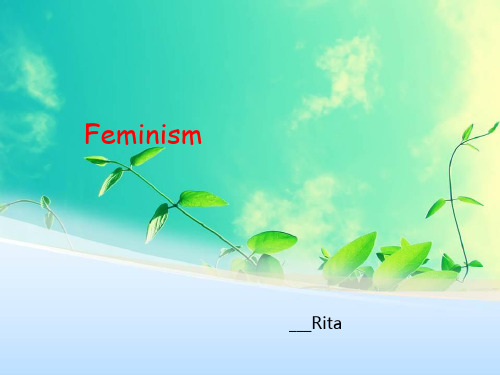
The influences of the first wave Feminism
The second Wave Feminism (also called Modern Feminism)
The second wave (1960s-1980s) dealt with the inequality of laws as well as cultural inequalities.
2020/4/4
The First Wave Feminism
The first wave refers to the movement of the 19th through early 20th centuries (1900s– 1920s), which dealt mainly with suffrage(投 票权选举权),working conditions and educational rights for women and girls.
Feminism
___Rita
Questions for you!
How would you define it as an ideology意识形态?
What comes to mind when you think of the word “feminism”?
2020/4/4
2020/4/4
2020/4/4
Feminists
Feminists are persons of either sex, or females only (in which case males may be profeminists), who believe in feminism.
E-C translation

The general survey of translation
Brief introduction to China’s translation history (four waves) Definitions of translation Classification of translation Prerequisites (必备条件)for translators 必备条件)
Brief introduction to China’s translation history (the First wave)
The most notable monastic translators of this period included An Shi-gao(安世高) (安世高) (active between 148-170), Dharmaraksa 达摩) (达摩)(232-309), Dao An(道安) (312 or (道安) 314-385), Kumarajiva(鸠摩罗什)(350(鸠摩罗什) 409), Hsuan-tsang(玄奘) (600-664) , (玄奘) among others.
The disadvantages of the above definitions for translation:
- The social, cultural contexts are neglected - The communicative nature of translation is not revealed - That translation is a creative practice is not mentioned as Luxun once pointed out: “真正精妙的翻译,其可宝贵,实不在创作之 真正精妙的翻译, 真正精妙的翻译 其可宝贵, 而真正精妙的翻译,其艰难实倍于创作” 下;而真正精妙的翻译,其艰难实倍于创作”
女权运动
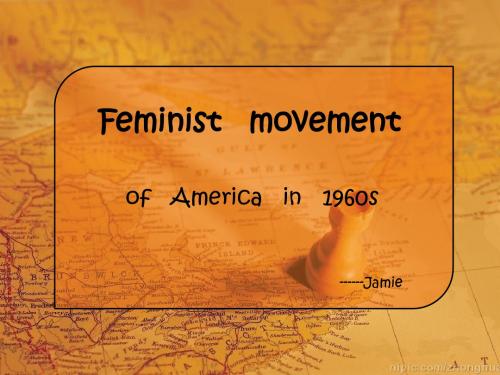
Christian feminism: reinterpret and understand Islamic feminism: full equality of all Muslims Jewish feminism: improve religious, legal, and social status of woman and open up new opportunity.
The 2nd wave of Feminist Movement
Aim: Improve women‟s
consciousness of sex oppression, and her personal experience as a political issue.
Feature: Associated
Three Stages
First wave: 18th—early 20th centuries, women’sh Amendment to the United States Constitutions (1919)
Second wave: 1960s—1980s,gender inequality in laws and culture, “The Personal and Political”
Feminist movement
of America in 1960s
------Jamie
Definition
The Feminist Movement, also known as the Women‟s Movement, Women‟s Liberation, Women‟s Lib, refers to a series of campaigns for reforms on issues such as reproductive right, domestic violence, maternity leave, equal pay, women’s suffrage, sexual harassment and sexual violence.
英语作文中第一第二第三第四第五的高级表达
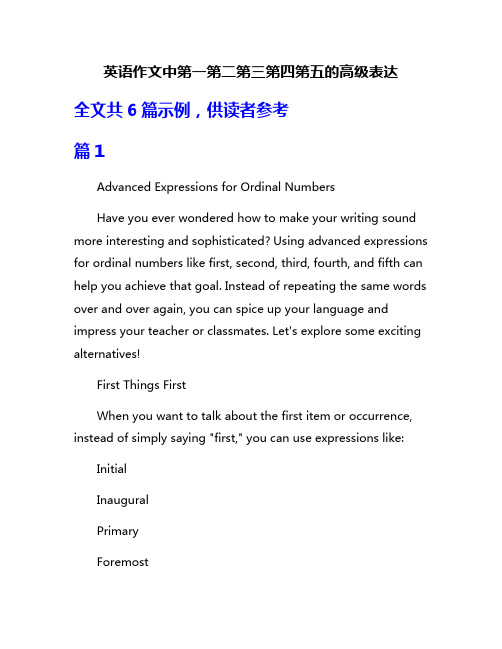
英语作文中第一第二第三第四第五的高级表达全文共6篇示例,供读者参考篇1Advanced Expressions for Ordinal NumbersHave you ever wondered how to make your writing sound more interesting and sophisticated? Using advanced expressions for ordinal numbers like first, second, third, fourth, and fifth can help you achieve that goal. Instead of repeating the same words over and over again, you can spice up your language and impress your teacher or classmates. Let's explore some exciting alternatives!First Things FirstWhen you want to talk about the first item or occurrence, instead of simply saying "first," you can use expressions like:InitialInauguralPrimaryForemostPrimordialFor example, instead of saying "This is the first time I've visited a museum," you could say, "This is my inaugural visit to a museum." Doesn't that sound more grown-up and impressive?The Second Time AroundMoving on to the second item or occurrence, here are some advanced expressions you can use:SecondarySubsequentEnsuingSuccessiveRunner-upInstead of saying "This is the second book I've read this month," you could say, "This is the subsequent book I've read this month." Doesn't that make you sound like a real bookworm?The Third WheelWhen referring to the third item or occurrence, you can use expressions like:TertiaryTrifoldTripletTriuneTrineFor instance, instead of saying "This is the third time I've won the spelling bee," you could say, "This is the trifold occasion I've emerged victorious in the spelling bee." Wow, that's quite a mouthful, but it sure sounds impressive!The Fourth DimensionFor the fourth item or occurrence, consider using these advanced expressions:QuaternaryQuadrupleQuadripartiteTetradicQuartileSo, instead of saying "This is the fourth book in the series," you could say, "This is the quadruple installment in the literary saga." That's bound to make you sound like a well-read scholar!The Fifth ElementLast but not least, when referring to the fifth item or occurrence, try using these expressions:QuintessentialQuintupleQuinaryPentadQuintetFor example, instead of saying "This is the fifth time I've won the science fair," you could say, "This marks the quintessential triumph in my scientific endeavors at the fair." Now, that's a statement worthy of a young Einstein!Mixing It UpRemember, you don't have to use these advanced expressions all the time. Mixing them up with simpler terms like "first," "second," "third," and so on can make your writing more engaging and dynamic. Just sprinkle them in here and there to add a touch of sophistication and variety.Practice Makes PerfectIncorporating new words and expressions into your writing takes practice, but it's a great way to expand your vocabulary and improve your language skills. Start by trying out a few of these advanced expressions in your next essay, story, or journal entry. Don't be afraid to experiment and have fun with language!In conclusion, using advanced expressions for ordinal numbers can elevate your writing and make it more engaging and impressive. So, the next time you need to refer to the first, second, third, fourth, or fifth item or occurrence, consider using one of these sophisticated alternatives. Your teacher and classmates will be amazed by your command of language, and you'll feel like a true wordsmith!篇2The Fancy Ways to Say "First" and More!Have you ever gotten bored of using the same words over and over in your writing? I know I have! I used to always say "first", "second", "third", and so on. But my teacher taught me some super cool new words to use instead. Let me share them with you!First up, the fancy way to say "first"! Instead of that boring old word, you can use "primordial", "inaugural", "premier","initial", or "originary". Those words just sound way more exciting, don't they?"Primordial" means like, existing at the very beginning of time. "The primordial oceans covered the earth billions of years ago." Isn't that awesome? I love picturing ancient seas!"Inaugural" has to do with inaugurations, like when a new president gets sworn in. But you can use it for any kind of first event or thing. "The inaugural monster truck rally was a smashing success!" I'd love to go to a monster truck show."Premier" is kind of like premiere, as in the first showing of a movie. But it can mean the first or most important thing too. "The premier art museum in the city just opened a Picasso exhibit." Picasso's paintings are so cool and abstract!"Initial" basically just means first, like the initial stage of a process. "The initial baking instructions say to preheat the oven."I can almost smell the fresh cookies!And "originary" refers to the origin or beginning of something. "Archaeological digs can reveal originary human settlements." Maybe they'll find ancient cave drawings!Okay, now let's move on to the second position. I learned words like "secondary", "second-tier", "vice", and "subdominant". Subdominant is such a weird word, but I like it!"Secondary" just means something that's not the most important, but still pretty important. Like, "Getting good grades is a secondary goal after making friends." Making friends is definitely the top priority in elementary school."Second-tier" has kind of a negative connotation, like something that's lower quality. "They got tickets to the second-tier seating at the concert." But hey, as long as you can go, who cares if you're not front row!"Vice" refers to something that's second-in-command, like a vice president. "The vice captain of the team helped motivate everyone." Being a leader sounds like a big responsibility.And finally, "subdominant" basically means subordinate, or less dominant than something else. "The subdominant melodies supported the main musical theme." I'll have to listen more carefully for those subdominant parts.Moving on to third place words like "tertiary", "trio", and "triplet". These are pretty straightforward but still fancier than just saying "third"."Tertiary" is a great adjective for anything related to the number three. "The tertiary colors are made by mixing primary and secondary colors." I'll never forget that thanks to the weird word!You could use "trio" to refer to a group of three things or people. "The trio of friends loved exploring the forest together." Doesn't that sound like an adventure?And "triplet" can mean one of three siblings born together, or just anything existing as a set of three. "I bought a triplet of beautiful crystal vases." I'd need to be really careful with those!Fourth is kind of a funny number to have fancy words for, but I learned some good ones: "quaternary", "quadruplet", and "quadrangle"."Quaternary" is a pretty obscure word, but you could use it the same way you'd use "fourth" as an adjective. "The quaternary era of the earth's development saw the rise of mammals." See, I can use big words about geology!"Quadruplet" obviously refers to four things or four siblings born together. "The zebras at the zoo just had an adorable set of quadruplets!" I want to see the baby zebras so badly.And a "quadrangle" is just a four-sided shape, like a square or rectangle. "The school's main quadrangle was lined with cherry blossom trees." Wow, that would be pretty in spring!Finally, some highbrow ways to say "fifth": "quintessential", "quintuplet", "quint", and "quintet". I love how they all start with "quin"."Quintessential" is one of my favorite words ever. It means representing the most perfect or typical example of something. "Chocolate chip cookies are the quintessential after-school snack." You know it's true!"Quintuplet" means one of five siblings born together. "The quintuplets all had distinct personalities from a very young age."I can't even imagine having four other siblings who were literally my age."Quint" is just a straightforward way of saying "five of something." "I packed a quint of juice boxes for our hiking trip." You can never have too many juice boxes when you're out adventuring.And a "quintet" means a group of five people, usually musicians or singers. "The string quintet performed beautifully at the outdoor concert." I'd love to hear them play under the stars.Well, there you have it - all the fancy ways I know to refer to first, second, third, fourth, and fifth in writing! Using these more advanced vocabulary words makes any essay, story, or paper sound so much more scholarly and refined.Not only that, but learning these new terms has helped me appreciate just how many nuances of meaning exist within our rich language. There are so many delightfully specific words to convey every little concept and idea.I hope sharing these vocabulary lessons has helped you level up your English language skills too. Why be boring when you can write with flair? Let's make everything we write quintessentially engaging from now on!篇3Certainly! Here's an essay on advanced expressions for first, second, third, fourth, and fifth in English compositions, written in a tone suitable for elementary school students. The length of the essay is approximately 2,000 words.Advanced Expressions for Ordinal Numbers in English CompositionsHello, my dear friends! Have you ever found yourself struggling to express ordinal numbers like first, second, third, fourth, and fifth in a more exciting way? Well, fear not, because today, we're going to explore some fantastic alternatives that will make your writing shine like a bright star!Let's start with the grand champion, the number one – the first! Instead of using the same old "first," why not try these captivating expressions:The foremostThe premierThe initialThe primordialThe pioneeringDoesn't that sound a lot more intriguing? Imagine writing, "The foremost step in baking a delicious cake is to gather all the ingredients." It's like you're transporting your readers into a world of culinary adventures!Now, let's move on to the runner-up, the second. Here are some delightful alternatives:The subsequentThe ensuingThe followingThe next in lineThe secondaryCan you picture yourself writing, "The subsequent chapter of the book was even more thrilling than the first"? It's like you're inviting your readers on a literary journey filled with suspense and excitement!Ah, the third – the bronze medalist! Let's spice it up with these fabulous expressions:The tertiaryThe trifoldThe tripleThe tripartiteThe third in successionImagine writing, "The tripartite structure of the essay made it easy to follow." Doesn't that sound so scholarly and sophisticated? Your teachers will be impressed by your vocabulary prowess!Moving swiftly along, we come to the fourth – the unsung hero! Here are some marvelous alternatives:The quadrupleThe quartetThe quaternaryThe fourth in the sequenceThe penultimate (before the last)Can you envision yourself writing, "The quartet of friends embarked on an adventurous camping trip"? It's like you're painting a vivid picture with your words, inviting your readers to join the journey!Last but not least, the fifth – the underdog that often gets overlooked. Let's give it the spotlight it deserves with these magnificent expressions:The quintupleThe quintetThe quinaryThe fifth in the seriesThe penultimate (before the last)Imagine writing, "The quintet of musicians performed a mesmerizing symphony." Doesn't that sound like a masterpiece waiting to be savored?Remember, my friends, using these advanced expressions not only adds flair and sophistication to your writing but also showcases your impressive vocabulary skills. Your teachers and classmates will be in awe of your linguistic prowess!However, it's essential to strike a balance and use these expressions judiciously. Overusing them might make your writing sound contrived or pretentious. Always aim for clarity and ensure that your writing flows naturally while incorporating these delightful alternatives.So, the next time you're composing an essay, a story, or any written piece, don't hesitate to reach into this treasure trove of advanced expressions. Your writing will truly shine like a linguistic masterpiece, leaving your readers in awe and admiration.Happy writing, my friends! May your words dance across the page with elegance and charm, captivating your audience from the foremost sentence to the quintuple paragraph.篇4English Expressions for Ordering Things: A Kid's GuideHave you ever wondered how to sound smarter when you're talking about the order of things? You know, like when you're telling a story or describing the steps in a process? Well, my friend, you've come to the right place! I'm going to teach you some fancy words that will make you sound like a true wordsmith.Let's start with the basics. You probably already know the words "first," "second," "third," "fourth," and "fifth." They're great words, but let's be real – they're a bit boring, aren't they? That's why we need to spice things up with some more advanced expressions.Expressions for "First"Instead of saying "first," you could try one of these:InitiallyPrimarilyForemostTo commence withAt the outsetFor example, instead of saying "First, I woke up," you could say, "Initially, I roused from my slumber." Doesn't that sound fancier?Expressions for "Second"Moving on to "second," here are some alternatives:SecondlySubsequentlyIn the succeeding stepAs a follow-upNext in lineSo, instead of "Second, I brushed my teeth," you could say, "Subsequently, I attended to my oral hygiene." Impressive, right?Expressions for "Third"Now, let's tackle "third":ThirdlyMoreoverFurthermoreIn additionAs the next stepFor instance, "Third, I got dressed" could become "Furthermore, I adorned myself with suitable attire." Fancy schmancy!Expressions for "Fourth"Feeling confident? Let's move on to "fourth":FourthlyAdditionallyWhat's moreAs another stepContinuing the sequenceInstead of "Fourth, I had breakfast," you could say, "Additionally, I partook in the most essential meal of the day." Impressive, isn't it?Expressions for "Fifth"Last but not least, let's explore some alternatives for "fifth":FifthlyFinallyUltimatelyAs the culminating stepTo conclude the processSo, "Fifth, I left for school" could become "Ultimately, I embarked on my educational journey." Brilliant!Now, I know what you're thinking: "That's a lot of fancy words!" And you're right, it is. But don't worry; you don't have to use them all the time. Just sprinkle them in here and there when you want to sound extra smart or impress your friends and teachers.Remember, the key to using these advanced expressions is to practice them regularly. Start by incorporating one or two into your daily conversations, and before you know it, you'll be a master of ordering and sequencing like a true wordsmith.So, go forth and dazzle the world with your newfound vocabulary prowess! And if you ever need a refresher, just come back and refer to this handy guide. Happy ordering!篇5The Quest for Eloquence: Mastering Advanced Expressions in English EssaysHello there, fellow students! As we embark on our journey to conquer the English language, one of the most crucial aspects we must master is the art of expressing ourselves elegantly, especially when it comes to those pesky ordinal numbers. You know, the ones that tell us the order of things – first, second, third, fourth, and fifth.Now, I know what you're thinking – "But I already know how to use those words! What's the big deal?" Well, my friends, let me enlighten you. While using the basic terms is perfectly fine, there's a whole world of advanced expressions waiting to be discovered, and trust me, they'll make your essays shine brighter than a thousand suns!Let's start with the granddaddy of them all – the first. Instead of using the same old "first," why not spice things up with expressions like "inaugural," "initial," or "primordial"? Imagine the look on your teacher's face when you write, "In the primordial stages of the project..." They'll be utterly impressed by your wordsmith prowess!Next up, the second. Now, this one can be a tricky little bugger, but fear not! You can opt for "subsequent," "ensuing," or even the delightfully archaic "secundus." Picture your classmates'jaws dropping as you eloquently describe, "The ensuing phase of the experiment was crucial."Ah, the third – the sweet spot between the beginning and the end. Here's where we can truly flex our linguistic muscles with words like "tertiary," "trine," or the ever-so-fancy "tercet." Your teacher will be left speechless when you write, "The tercet aspect of our analysis revealed intriguing insights."But wait, there's more! The fourth is a golden opportunity to showcase your mastery of the English language. Instead of the mundane "fourth," why not dazzle your audience with "quaternary," "quadric," or the tongue-twisting "quartic"? Imagine the awe-inspiring effect of "The quartic phase of our experiment yielded unexpected results."Last but certainly not least, the fifth. This is where we can truly shine with words like "quintessential," "quinary," or the delightfully quirky "quintan." Your peers will be green with envy when you elegantly state, "The quintessential component of our presentation was the visual aids."Now, I know what you're thinking – "That's all well and good, but how do I remember all these fancy words?" Fear not, my fellow scholars, for I have a foolproof method to help you commit them to memory. Simply create a mnemonic device, alittle rhyme or phrase that encapsulates the essence of each expression.For example, "Inaugural, the first, a new start" or "Tertiary, the third, a triple treat." Trust me, these little ditties will stick in your mind like glue, and before you know it, you'll be wielding these advanced expressions like a linguistic samurai!But wait, there's more! Not only will mastering these expressions make your essays stand out, but they'll also impress your teachers and peers with your extensive vocabulary. Who knows, you might even inspire others to follow in your footsteps and embark on their own quest for linguistic excellence.So, my dear friends, let us raise our metaphorical quills and embrace the challenge of incorporating advanced expressions into our writing. Together, we shall conquer the English language, one eloquent essay at a time. After all, as the quintessential saying goes, "The pen is mightier than the sword," and with our newly acquired arsenal of vocabulary, our pens shall reign supreme!篇6Advanced Expressions for First, Second, Third, Fourth, and Fifth in English EssaysDo you ever feel like your English essays sound a bit repetitive and boring? Well, you're not alone! Many students find themselves using the same old words like "first," "second," "third," and so on, over and over again. But did you know that there are many more exciting and advanced ways to express these ideas? Using more varied language can make your writing sound much more interesting and impressive.Let's start with the word "first." Instead of just saying "first," you could try using expressions like "to begin with," "initially," "at the outset," or "the prime example." For instance, instead of writing "First, I will discuss the importance of exercise," you could say, "To begin with, let's explore the significance of regular physical activity."Now, what about "second"? Here are some alternatives you could use: "furthermore," "in addition," "moreover," or "additionally." For example, "Second, exercise helps to improve cardiovascular health" could become "Furthermore, engaging in physical exercise has been shown to enhance cardiovascular fitness."Moving on to "third," you could try phrases like "another significant point," "what's more," "beyond that," or "in addition to this." So, instead of "Third, exercise can boost your mood,"you might write, "Another significant point to consider is that regular physical activity can elevate one's overall mood and emotional well-being."For "fourth," you could use expressions such as "additionally," "on top of that," "coupled with this," or "not to mention." For instance, "Fourth, exercise can help you sleep better" could become "On top of that, incorporating regular exercise into one's routine can promote improved sleep quality and duration."Finally, for "fifth," you might try "last but not least," "finally," "in conclusion," or "the final point to make." So, "Fifth, exercise can improve your confidence" could be rephrased as "Last but not least, engaging in physical activity can bolster one'sself-confidence and overall sense of self-worth."Now, let's practice using some of these advanced expressions in a sample paragraph:"To begin with, regular physical exercise is essential for maintaining a healthy lifestyle. Furthermore, engaging in physical activity has been shown to enhance cardiovascular fitness and overall stamina. Another significant point to consider is that regular exercise can elevate one's overall mood and emotional well-being. On top of that, incorporating regularexercise into one's routine can promote improved sleep quality and duration. Last but not least, engaging in physical activity can bolster one's self-confidence and overall sense of self-worth."See how using these more advanced expressions can make your writing sound more sophisticated and engaging? It's a simple trick that can really elevate the quality of your essays.Remember, mastering these advanced expressions takes time and effort, but the payoff is well worth it. Your writing will become more polished, engaging, and enjoyable to read. So, the next time you're working on an English essay, challenge yourself to incorporate some of these expressions and watch your writing soar to new heights!。
中国互联网第三次浪潮到来(ThethirdwaveofChineseInternet)
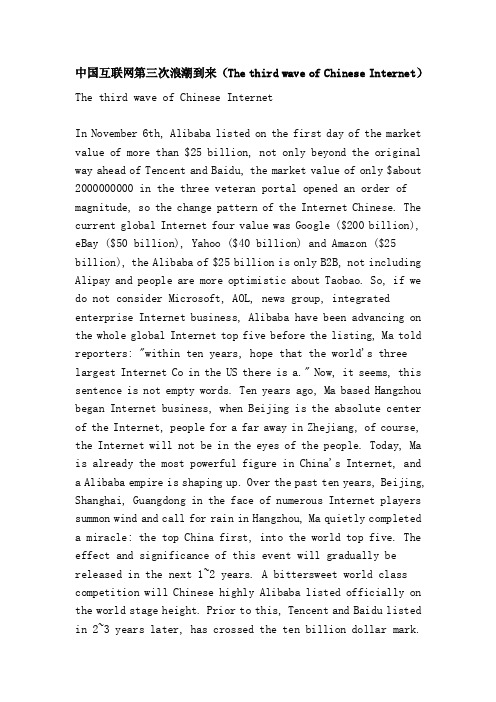
中国互联网第三次浪潮到来(The third wave of Chinese Internet)The third wave of Chinese InternetIn November 6th, Alibaba listed on the first day of the market value of more than $25 billion, not only beyond the original way ahead of Tencent and Baidu, the market value of only $about 2000000000 in the three veteran portal opened an order of magnitude, so the change pattern of the Internet Chinese. The current global Internet four value was Google ($200 billion), eBay ($50 billion), Yahoo ($40 billion) and Amazon ($25 billion), the Alibaba of $25 billion is only B2B, not including Alipay and people are more optimistic about Taobao. So, if we do not consider Microsoft, AOL, news group, integrated enterprise Internet business, Alibaba have been advancing on the whole global Internet top five before the listing, Ma told reporters: "within ten years, hope that the world's three largest Internet Co in the US there is a." Now, it seems, this sentence is not empty words. Ten years ago, Ma based Hangzhou began Internet business, when Beijing is the absolute center of the Internet, people for a far away in Zhejiang, of course, the Internet will not be in the eyes of the people. Today, Ma is already the most powerful figure in China's Internet, and a Alibaba empire is shaping up. Over the past ten years, Beijing, Shanghai, Guangdong in the face of numerous Internet players summon wind and call for rain in Hangzhou, Ma quietly completed a miracle: the top China first, into the world top five. The effect and significance of this event will gradually be released in the next 1~2 years. A bittersweet world class competition will Chinese highly Alibaba listed officially on the world stage height. Prior to this, Tencent and Baidu listed in 2~3 years later, has crossed the ten billion dollar mark.The Alibaba redefined the height of China's Internet, greatly enhance the imagination of investors. This year, the world's Internet users will reach 1 billion 300 million, the popularity rate of about 20%, while China's Internet users reached 160 million, approaching the first of the United States (200 million). But the popularity of Internet users in China is only 12%. At present, the United States, Japan, South Korea, Europe and many other countries, the popularity of Internet users has reached more than 70%, the future of China's Internet is full of greater expectations. Internet giants such as Google, eBay, Yahoo and Amazon are based on developed and huge America, and are geared to the global layout and become a leader in many countries. And Alibaba and other domestic websites are based only on the Chinese market in the early stages of the Internet development. So, this ahead of the arrival of the world level mixed. Hi needless to say, the worry is that although a China Internet Corporation value is very high, but also the lack of global competitiveness, the core competitiveness in the market and even China innovation is very weak. E-commerce: the core of the third wave, in the next 2~3 years, Internet Co will face new opportunities for entrepreneurship. 10 years ago, the first wave of the Internet began in the creation of three major portals such as Sohu. In July 1999, the little-known listed in Nasdaq, the first time to see huge opportunities Chinese risk investment market, driven by the three major portals market tide, and the rise of a large number of China Internet Corporation, the formation of the first round of the tide. After 2004, Ctrip, a grand listing, a group of SP companies listed, Chinese Internet second round wave tide began to set off the wave, the peak is August 5, 2005 Baidu listed.Beginning in August this year, the perfect time and space, Jinshan, giant and other four online games company listed, for the third wave of Internet warming. The real event of the third wave is the successful listing of Alibaba, bringing China into the new hub of global Internet capital pursuit. In the first wave, we completely to the United States through; the second wave has its own characteristics, but also be able to compete with the U.S. market heat and rhythm line, especially Web 2. However, the third wave is pure China characteristics of the wave of the Internet, this time, how to make the United States to study or run out of Chinese.Electronic commerce has become a priority among priorities in the third wave: after SP, games, chat, Q coins and other entertainment wave, the rise of e-commerce to expand the depth and thickness of Chinese internet. It can be said that Ma will bring China's e-commerce officially into the mainstream. In fact, e-commerce is the old concept, the old model, but in China has not become the center of the wave. By contrast, the United States has been the focus of e-commerce. Among the top four Internet giants, eBay and Amazon are e-commerce companies apart from Google and YAHOO. So, the tide of e-commerce China is a late show, a show of accumulate steadily. Because of the close integration of e-commerce and traditional industries, China's mainstream society is more trusted and more practical, helping to greatly change the social impact and social image of the internet. Ma Yun: the new flag character Alibaba listed, announced that Ma Yun became China's Internet leader, a new pattern of preliminary laid. Alibaba and Tencent and Baidu constitute the first camp, three ten billion U.S. dollars of Internet Co obvious advantages. And more than $5 billion of thepublic and the giants, as well as 20~30 million U. s.dollars Ctrip, Sina, NetEase, Shanda and other 6 constitute the second camp, but also in their respective fields of leading Internet powers. Sohu, The9, perfect, Jinshan and other more than 10 Internet Co constitute the third echelon, each has its own characteristics. Compared with 3~5 years ago, the three major portals to dominate the situation, the current situation is very different. Any industry has a banner character, they define the image and status of an industry. In the ten years of the Internet, there are different leaders at each stage. From Zhang Shuxin to Zhang Zhaoyang, Ding Lei, and then to Chen Tianqiao, Robin Li, and then to Ma Huateng, the industry is developing, and the characters are updating. With the listing of Alibaba, a new symbolic leader stands out, that is, Ma yun. Ma Yun recognized the most difficult field of e-commerce, ten years like a day. Nowadays, Alibaba has a lot of boundaries with many Internet Co focusing on short-term interests. More importantly, Ma changed the Internet hero in the traditional sense of the meaning, boundaries and possibilities. Ma opened the 2 stage of the commercialization of the internet. Among all Internet leaders, Jack Ma is the least connected to the Internet, and the one that is not limited to the internet. It's easy to predict the future heights of many Internet Co because the ceiling in their field is the ceiling of their career. But Ma is different. It is difficult to predict the height of Ma and Alibaba, because their career will likely surpass the Internet, strong involvement in the financial sector, the field of logistics, circulation and so on, so, Ma and the Alibaba highly filled with huge variables. Ma Yun's future, even today's Ma Yun do not know. Ten years, the internet no matter how changes, but ultimately still relatively pure, and traditionalindustries have a distinctive distinction. But from now on, these will change. China's Internet has grown up, lost the simple, lost the pure, regardless of whether you like it or not, this era can not be stopped. Ma came, and Shi Yuzhu came, they are not just Internet users, but also through all aspects of Chinese business, the Internet competition is open, but also cruel. Since then, the Internet has been a naked business, a game of money. This is, of course, inevitable, even progress. Zhejiang: China's new Internet Center, the first wave of China's Internet hotspots are basically concentrated in the Zhongguancun area of Beijing. The second wave, China's Internet began to be a polycentric pattern of scattered, Shenzhen's Ma Huateng, Robin Li of Beijing, Shanghai's Chen Tianqiao, Guangzhou's Ding Lei, is this period of the most dazzling hero. Based on the long-term Ma Hangzhou Zhejiang become the rise of the Internet banner, the first in the domestic A shares listed in the pure Internet Co network Sun Deliang, first on the Hangzhou headquarters of the venture capitalist Zhu Min, let Zhejiang Internet broke the power of personal savings, I will also move to Zhejiang,All these indicate that Zhejiang will be one of the centers of new rising after Beijing, Shanghai, Shenzhen, Guangzhou and other major Internet cities. The rise of the Internet in Zhejiang, the deeper reason lies in: China's Internet development began to go deeper into traditional industries, China's private economy base camp led the third wave of the Internet, it is logical. The next 3~5 years, Zhejiang will challenge Beijing, Shanghai, Guangdong's Internet status, risk investment will re evaluate the potential of the Internet in Zhejiang, regional entrepreneurship will heat up sharply.Zhejiang will give birth to more heavyweight Internet Co, especially in the field of electronic commerce, Zhejiang will become the center of accumulate steadily. China's Internet is no longer a concept, nor is it a small company's playground, but the giants gathered in the arena. As a result, mergers and acquisitions will be greatly intensified, and competition in the industry will force mergers and acquisitions to become the preferred strategy. Secondly, the foreign Internet giant's "independent strategy" further suffered setbacks, will be greater capital investment and greater efforts to merge the localization strategy transformation. More opportunities in the future, the greater the change is still behind. Link: Glossary: SP (Service Provider service provider ") refers to the direct provider of mobile Internet services application service for mobile phone users, is responsible for providing the service according to the requirements of users and developers, the current can be divided into three categories: door SP - SMS apartment layout provided by the portal,. There are several Sohu, Sina, NetEase, and Tom, main ringtones, pictures, text expression, news, games and other professional SP company; SMS industry, content and apartment layout SP is almost completely overlap, but the advantage of innovative technology and creative services; special type SP, represented by Tencent, no common images, ringtones, games and other services, focus on their monopoly advantage with QQ derived from sms. BLOCK the only challenge from the talent challenge listed on the first day of Alibaba vice president Wei Zhe remarks we not from the market prospects; from macro policies and regulations; nor from our development strategy. Our only challenge comes from talent. If our talent can not take the lead in the top three, the company can not achieve theambitious goal. This is our biggest challenge in pre IPO and post ipo. All of our development revolves around the ability to bring greater value to our existing and future customers. We will consider more domestic customer service center construction, will pay attention to overseas market development, will pay more attention to the application of new technology in this field. Our investment direction is: first, staring at the value to our customers; second, and we repeat the technique, including domestic and abroad; third, new applications for electronic commerce, is not Alibaba, but on other platforms is proved feasible mode. Do not need too much internationalization change, I do not think Alibaba after the listing, to face too many changes in internationalization, because at the beginning of the establishment of Alibaba is a localization and internationalization of a very good combination of companies. Why do you say that? We evaluate the internationalization of an enterprise, depending on whether its shareholders, business and team are international. These features are available on the first day of Alibaba's birth. There are three problems behind the brand: innovation issues, global distribution capabilities and services. Alibaba has solved the problem of innovation very well. Our business model is the world's largest innovation. On the other hand, the global Internet sales and distribution channels is relatively simple, do not need to set up the line channels, in the difficulty of service, so we in North America, Europe and Hongkong have a customer service center, to provide customers with the best service. We should further build innovation, use the Internet's network effect, do a good job of global channels, but also to strengthen the global landing service. Small and medium enterprises how to develop, the first small and medium-sizedenterprises should focus on, but also flexible, it seems a bit contradictory, but this is precisely the success of Alibaba road. Strategy should be focused and tactical agility.Small and medium-sized enterprises should be standardized as they grow up. Not because SMEs can forgive themselves today and solve problems when they grow up. If so, many small and medium enterprises in China are not big. We pay great attention to the protection of intellectual property rights, and we also pay great attention to the issue of integrity. Small and medium-sized enterprises rely on the accumulation of little bit of good faith. Attention should also be paid to the problem of talents. Small and medium-sized business owners should ask themselves, dare to share?. Ma if the stock was controlled in the hands of 18 founders, Alibaba will not have today. Many business owners of SMEs often fail to see that. I Alibaba listing, from the heart of the experience is "focus, flexibility, innovation, talent, integrity."".。
- 1、下载文档前请自行甄别文档内容的完整性,平台不提供额外的编辑、内容补充、找答案等附加服务。
- 2、"仅部分预览"的文档,不可在线预览部分如存在完整性等问题,可反馈申请退款(可完整预览的文档不适用该条件!)。
- 3、如文档侵犯您的权益,请联系客服反馈,我们会尽快为您处理(人工客服工作时间:9:00-18:30)。
The Third Wave (Toffler)From Wikipedia, the free encyclopediaFor Samuel P. Huntington's book, see The Third Wave: Democratization in the Late Twentieth Century.The Third Wave is a book published in 1980 by Alvin Toffler. It is the sequel to Future Shock, published in 1970, and the second in what was originally just a trilogy that was continued with Powershift: Knowledge, Wealth and Violence at the Edge of the 21st Century in 1990. A new addition, Revolutionary Wealth, was published, however, in 2006 and may be considered as a major expansion of The Third Wave.Toffler's book describes the transition in developed countries from Industrial Age society, which he calls the "Second Wave", to Information Age "Third Wave" society.Contents[hide]• 1 Toffler's Wave Theory• 2 Anthropological Interpretation• 3 Key Characteristics Of The Third Wave Society• 4 Fourth Wave• 5 Publication• 6 References•7 External linksToffler's Wave Theory[edit]In the book Toffler describes three types of societies, based on the concept of 'waves' - each wave pushes the older societies and cultures aside.•The First Wave is the settled agricultural society which prevailed in much of the world after the Neolithic Revolution, which replaced hunter-gatherer cultures.•The Second Wave is Industrial Age society. The Second Wave began in Western Europe with the Industrial Revolution, and subsequently spread across the world. Key aspects of Second Wave society are the nuclear family, a factory-type education system and the corporation.Toffler writes:"The Second Wave Society is industrial and based on mass production, mass distribution, mass consumption, mass education, mass media, mass recreation, mass entertainment, and weapons of massdestruction. You combine those things with standardization,centralization, concentration, and synchronization, and you wind up with a style of organization we call bureaucracy."•The Third Wave is the post-industrial society. Toffler says that since the late 1950s most countries have been transitioning froma Second Wave society into a Third Wave society. He coined many wordsto describe it and mentions names invented by others, such as the Information Age.Anthropological Interpretation[edit]The transition from the earlier hunter-gatherer societies to the agrarian and agricultural societies is also known as the Neolithic Revolution. This coincides with the transition from the Mesolithic era to the Neolithic era (respectively, the Middle and Late Stone Age). The transition from the Paleolithic to the Mesolithic (Early to Middle Stone Age), in turn, largely coincides with the emergence of the modern Homo sapiens from earlier, related archaic human species.Nearly extinct in the present-day world, hunter-gatherer societies (which one might term the "Zero Wave" societies) are not recognized in Toffler's scheme. Similarly, in the classical Three-age system, distinctions are recognized between the Stone Age era Bronze Age, Iron Age, the boundary between the latter two c. 1300-1200 BC being as dramatic as that demarcating Toffler's waves. None of these phases are clearly recognized in the Toffler scheme, in part due to the prevalence of the latter phase amongst present-day pre-industrial societies.The transition from Toffler's First Wave and Second Wave is sometimes also recognized as a transition from the Iron Age to the Steel Age. At present, there is no clear delineation of the latest transition, though sometimes the term Post-industrial society, originating from Daniel Bell, is used, in addition to Toffler's "Third Wave society".The important point is that the nature of society (relationships between people and political and economic structures) are significantly altered by the impact of new technology. That to some degree peoples lives are modified to serve the technology.Key Characteristics Of The Third WaveSociety[edit]This section possibly contains original research. Please improveit by verifying the claims made and adding inline citations.Statements consisting only of original research may be removed.(June 2010)Though the society foreseen is still emerging, with the dramatic transitions of the past two decades (e.g. Cell Phones, Internet, the rise of non-national and super-national powers, etc.), several distinguishing features were posed as characteristic of this new society. Among others, these included•The rolling back of the Industrial-Era creed of "standardization", as exemplified in the one-size-fits-all approach typical ofinstitutions of this era, such as the education system, factories, governments, mass media, high volume mass production anddistribution, etc.•The attack on the nation-state from above and below and progressive obsolescence of the nation-state itself.•The assault on the nation-state from below would include both the gradual loss of consensus, such as has characterized the politics of the United States in the 21st century, as well as political turmoil in China (largely split amongst urban-rural lines), Israel (orthodox vs. secular), Germany (the deadlock following the 2005 elections), the Islamic world (fundamentalist or traditional vs.secular) and elsewhere. It would include the rise of regional interests and the progressive devolution of the nation-state itself;e.g. the autonomization of Wales and Scotland in Britain; of Nunavutand Canada; the frequent incidence of separatist movements, the dissolution of Yugoslavia, Czechoslovakia, the USSR, Ethiopia, the emergence of microstates, such as East Timor.•The assault on the nation-state from above would include the rise of powerful non-national entities: IGO's, multinationalcorporations, religions with global reach, and even terrorist organizations or cartels. It would include the progressivehemming-in of national economies and of nation-states under a growing network of super-national organizations and affiliations;e.g. the European Union, the North American Union, the newly formedAfrican Union, as well as organizations such as the WTO, NAFTA or International Criminal Court.•The eclipsing of monetary wealth by knowledge and information as the primary determinant of power and its distribution. This was also discussed more fully in the sequel Powershift.•The eclipsing of manufacturing and manufacturing goods by knowledge-production and information-processing as the primary economic activity. This was significantly expanded on in the sequel Powershift, where Toffler nearly drew the line between the two along gender lines, coining the term "Material-Ismo" (a play on"machismo") to represent the infatuation with the industrial era world of manufacturing (as opposed to paper-pushing), and equating value with product (as opposed equating value with information).The criticism came down particularly hard on the former Stalinist societies, that have in recent years seen a substantial dislocation, particularly along gender lines, with female life expectancy now as much as 10 years greater than male life expectancy throughout the former USSR.•The emergence of various high technologies, such as cloning, global communications networks, nanotechnology, etc. However, theseaspects were discussed in greater depth in Future Shock and somewhat deemphasized in the Third Wave.• A transformation of the very character of democracy, itself, from rule-by-periodic polling at the election booth, toward a moredirect interaction between the government and its populace. To a large extent, this has already emerged with the rise of the Internet, though it has not yet congealed in the form of a fundamental revision of the constitution of any state. The trend toward on-line voting in the United States, following the election crisis of 2000, may be seen as a first step in this direction.Discussing the book in a later interview, Toffler said thatindustrial-style, centralized, top-down bureaucratic planning would be replaced by a more open, democratic, decentralized style which he called “anticipatory democracy.”[1]Despite the forecast of the obsolescence of the order of nation-states, and the rise of super-national entities, what was not forecast was the emergence of a world political union cast in the form of the United States of Earth. In the framework of the Wave Theory of Toffler, such an institution, if constituted along lines similar to present-day nation states, would represent the very archetype of the Second Wave writ large. Curiously, the potential of a federal world union cast in the mould of a heterogeneous mix (e.g. nations, labor unions, religions affiliations, businesses, popular assemblies, IGO's, etc. all brought together in an overlapping mix) was left open.Toffler left open both the question of what the outcome of the transformation of the structure of democracy was to entail, as well as the question of what kind of world order would supersede the order of nation-states. This became particularly acute in the 1993 addendum War and Anti-War which raised the issue of the "Genie out of the Bottle" (nuclear proliferation) and the illusion of the "Zone of Peace" being broken (i.e., 9-11, Madrid, London, etc.), but remained silent on the questions of what changes in the structure of the world would be required to resolve these dilemmas, if the nation-state is to become obsolete and "United State of Earth" type global organizations just as much so.Fourth Wave[edit]Though talk about another major historical watershed on par with the Neolithic Revolution may seem premature, given that the Third Wave hasonly reached its crest with the advent of the Internet, one of the central themes of Future Shock is that history, itself, would accelerate to the point where all of the past would catch up with the present. Therefore, the question has been raised with increasing frequency as to whether a Fourth Wave is looming or already underway with the most recent dislocations that appear to be taking place in the world.There has already been one book, published in 1993, titled Fourth Wave: Business in the 21st Century by Herman Bryant Maynard and Susan E Mehrtens, which forecasts and advocates the rise of a form of eco-globalism in the 21st century. A closer reading of the book, however, may mistake its central theme as a partial completion of the questions left open by Toffler concerning the nature of Third Wave society at the global level, rather than another major historical watershed.However, the question is still unresolved and no official word has been forthcoming from Toffler. Nor is one likely, given the quote "the sweeping synthesis [of the trilogy] Powershift。
